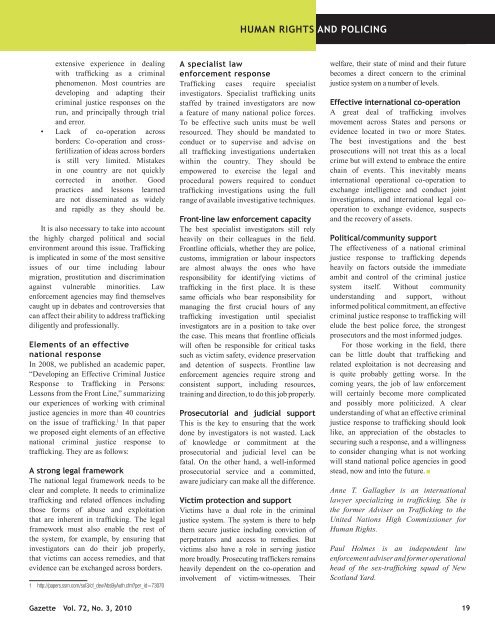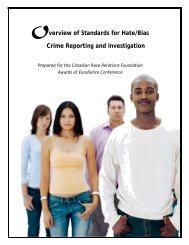RCMP Gazette Human Rights and Policing - Alberta Hate Crimes ...
RCMP Gazette Human Rights and Policing - Alberta Hate Crimes ...
RCMP Gazette Human Rights and Policing - Alberta Hate Crimes ...
Create successful ePaper yourself
Turn your PDF publications into a flip-book with our unique Google optimized e-Paper software.
huMAN RiGhTS AND POliCiNG<strong>RCMP</strong> COVERextensive experience in dealingwith trafficking as a criminalphenomenon. Most countries aredeveloping <strong>and</strong> adapting theircriminal justice responses on therun, <strong>and</strong> principally through trial<strong>and</strong> error.• Lack of co-operation acrossborders: Co-operation <strong>and</strong> crossfertilizationof ideas across bordersis still very limited. Mistakesin one country are not quicklycorrected in another. Goodpractices <strong>and</strong> lessons learnedare not disseminated as widely<strong>and</strong> rapidly as they should be.It is also necessary to take into accountthe highly charged political <strong>and</strong> socialenvironment around this issue. Traffickingis implicated in some of the most sensitiveissues of our time including labourmigration, prostitution <strong>and</strong> discriminationagainst vulnerable minorities. Lawenforcement agencies may find themselvescaught up in debates <strong>and</strong> controversies thatcan affect their ability to address traffickingdiligently <strong>and</strong> professionally.Elements of an effectivenational responseIn 2008, we published an academic paper,“Developing an Effective Criminal JusticeResponse to Trafficking in Persons:Lessons from the Front Line,” summarizingour experiences of working with criminaljustice agencies in more than 40 countrieson the issue of trafficking. 1 In that paperwe proposed eight elements of an effectivenational criminal justice response totrafficking. They are as follows:A strong legal frameworkThe national legal framework needs to beclear <strong>and</strong> complete. It needs to criminalizetrafficking <strong>and</strong> related offences includingthose forms of abuse <strong>and</strong> exploitationthat are inherent in trafficking. The legalframework must also enable the rest ofthe system, for example, by ensuring thatinvestigators can do their job properly,that victims can access remedies, <strong>and</strong> thatevidence can be exchanged across borders.1 http://papers.ssrn.com/sol3/cf_dev/AbsByAuth.cfm?per_id=73070A specialist lawenforcement responseTrafficking cases require specialistinvestigators. Specialist trafficking unitsstaffed by trained investigators are nowa feature of many national police forces.To be effective such units must be wellresourced. They should be m<strong>and</strong>ated toconduct or to supervise <strong>and</strong> advise onall trafficking investigations undertakenwithin the country. They should beempowered to exercise the legal <strong>and</strong>procedural powers required to conducttrafficking investigations using the fullrange of available investigative techniques.Front-line law enforcement capacityThe best specialist investigators still relyheavily on their colleagues in the field.Frontline officials, whether they are police,customs, immigration or labour inspectorsare almost always the ones who haveresponsibility for identifying victims oftrafficking in the first place. It is thesesame officials who bear responsibility formanaging the first crucial hours of anytrafficking investigation until specialistinvestigators are in a position to take overthe case. This means that frontline officialswill often be responsible for critical taskssuch as victim safety, evidence preservation<strong>and</strong> detention of suspects. Frontline lawenforcement agencies require strong <strong>and</strong>consistent support, including resources,training <strong>and</strong> direction, to do this job properly.Prosecutorial <strong>and</strong> judicial supportThis is the key to ensuring that the workdone by investigators is not wasted. Lackof knowledge or commitment at theprosecutorial <strong>and</strong> judicial level can befatal. On the other h<strong>and</strong>, a well-informedprosecutorial service <strong>and</strong> a committed,aware judiciary can make all the difference.Victim protection <strong>and</strong> supportVictims have a dual role in the criminaljustice system. The system is there to helpthem secure justice including conviction ofperpetrators <strong>and</strong> access to remedies. Butvictims also have a role in serving justicemore broadly. Prosecuting traffickers remainsheavily dependent on the co-operation <strong>and</strong>involvement of victim-witnesses. Theirwelfare, their state of mind <strong>and</strong> their futurebecomes a direct concern to the criminaljustice system on a number of levels.Effective international co-operationA great deal of trafficking involvesmovement across States <strong>and</strong> persons orevidence located in two or more States.The best investigations <strong>and</strong> the bestprosecutions will not treat this as a localcrime but will extend to embrace the entirechain of events. This inevitably meansinternational operational co-operation toexchange intelligence <strong>and</strong> conduct jointinvestigations, <strong>and</strong> international legal cooperationto exchange evidence, suspects<strong>and</strong> the recovery of assets.Political/community supportThe effectiveness of a national criminaljustice response to trafficking dependsheavily on factors outside the immediateambit <strong>and</strong> control of the criminal justicesystem itself. Without communityunderst<strong>and</strong>ing <strong>and</strong> support, withoutinformed political commitment, an effectivecriminal justice response to trafficking willelude the best police force, the strongestprosecutors <strong>and</strong> the most informed judges.For those working in the field, therecan be little doubt that trafficking <strong>and</strong>related exploitation is not decreasing <strong>and</strong>is quite probably getting worse. In thecoming years, the job of law enforcementwill certainly become more complicated<strong>and</strong> possibly more politicized. A clearunderst<strong>and</strong>ing of what an effective criminaljustice response to trafficking should looklike, an appreciation of the obstacles tosecuring such a response, <strong>and</strong> a willingnessto consider changing what is not workingwill st<strong>and</strong> national police agencies in goodstead, now <strong>and</strong> into the future. ▪Anne T. Gallagher is an internationallawyer specializing in trafficking. She isthe former Adviser on Trafficking to theUnited Nations High Commissioner for<strong>Human</strong> <strong>Rights</strong>.Paul Holmes is an independent lawenforcement adviser <strong>and</strong> former operationalhead of the sex-trafficking squad of NewScotl<strong>and</strong> Yard.<strong>Gazette</strong> Vol. 72, No. 3, 2010 19







